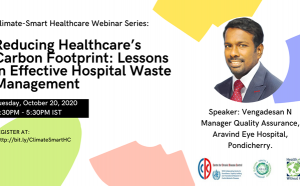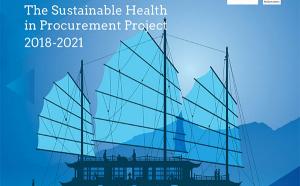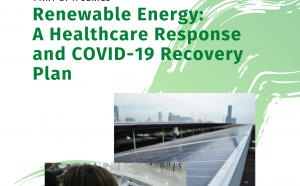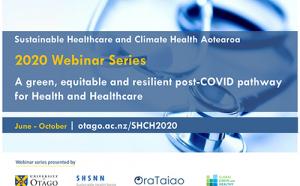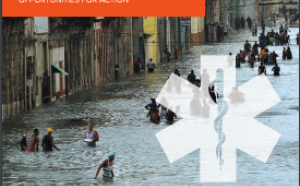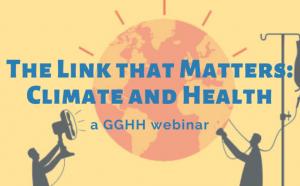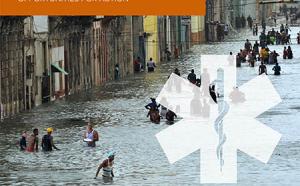From antibiotic stewardship and infection prevention and control measures, to wastewater treatment and procurement practices, healthcare facilities have a vast range of tools at their disposal to combat AMR. It remains clear, however, that if no effective action is taken, AMR will increasingly damage public health and place a greater burden upon already strained healthcare budgets.7

This HCWH Europe webinar presents the results of HCWH Europe’s recent survey to identify best practice to tackle AMR in healthcare facilities across Europe. The subsequent report sets out recommendations to help Europe’s healthcare sector mitigate its contribution to AMR.
This webinar aims to:
- Raise awareness about the contribution of Europe’s healthcare sector to the emergence of antimicrobial resistance
- Highlight and share best practice among healthcare facilities on how to address the development and spread of drug-resistant bacteria
- Discuss and identify further room for action to help keep antibiotics effective in the treatment of bacterial infections
Webinar recording
This webinar aims to:
- Raise awareness about the contribution of Europe’s healthcare sector to the emergence of antimicrobial resistance
- Highlight and share best practice among healthcare facilities on how to address the development and spread of drug-resistant bacteria
- Discuss and identify further room for action to help keep antibiotics effective in the treatment of bacterial infections
Presentations and speakers
Ana Paula Coutinho Rehse, Technical Officer – World Health Organization Regional Office for Europe

Ana Paula works on the Health Emergencies Programme for the WHO. In her role, she supports countries with implementing and strengthening of Infection Prevention and Control programmes at both national and facility levels as well as with outbreak investigation and response. Ana Paula works closely with the WHO Europe Antimicrobial Resistance working group, where she leads activities in the area of Infection Prevention and Control and linkages with antimicrobial resistance. Before working for the WHO in 2006, Ana Paula was in Pakistan for the 2005 earthquake response and in Angola for the Marburg outbreak.
Walter Zingg, Senior Physician, Infection Control Programme – University of Geneva Hospitals
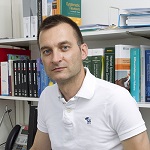
Walter is an expert in Infection Prevention and Control (IPC). He coordinated the European “Prevention of Hospital Infection by Intervention and Training” (PROHIBIT) project that aimed to understand existing guidelines and practices to prevent healthcare-associated infections in European hospitals. He also played a key role as lead scientist in defining key components of IPC for the European Centre for Disease Prevention and Control (ECDC). Additionally, Walter acted as an expert for the WHO hand hygiene guidelines and participated in the ECDC point prevalence survey of healthcare-associated infections. His publication list includes over 90 articles in peer-reviewed journals and six book chapters.
Presentation: Neutralizing Antibiotic Resistant Bacteria
Thomas Møller, Environmental Coordinator – Aarhus University Hospital

An environmental engineer by training, Thomas coordinates the approach to both waste and wastewater at Aarhus University Hospital. Thomas has experience in mapping the sources of pharmaceutical pollution from hospital activities and developing technology to remove pharmaceuticals from wastewater. He also initiated the ongoing project at Aarhus University Hospital to address the challenges of implementing the circular economy in the healthcare sector’s supply chain. He recently collaborated with the Danish Technological Institute to investigate whether the use of peracetic acid can neutralise ciprofloxacin-resistant bacteria in untreated wastewater.
Presentation: Tackling AMR in Europe’s healthcare facilities
Jean-Yves Stenuick, Pharmaceuticals Policy & Projects Officer – Health Care Without Harm (HCWH) Europe

Jean-Yves leads Health Care Without Harm (HCWH) Europe’s Safer Pharma programme that deals with pharmaceutical pollution and its link with the development and spread of antimicrobial resistance. He is notably responsible for the Safer Pharma campaign that aims to protect the environment from pharmaceutical pollution at all stages of their life cycle. Jean-Yves recently authored a report identifying best practice to tackle AMR in European healthcare facilities and provides guidelines for hospitals and health systems. He previously worked at a Brussels-based think tank leading the organisation’s health and wellbeing programme to ensure stronger EU action on issues ranging from antimicrobial resistance to disruptive health technologies.


